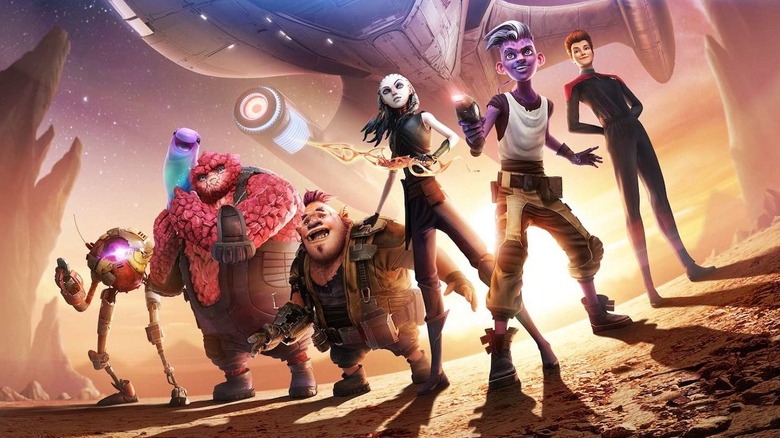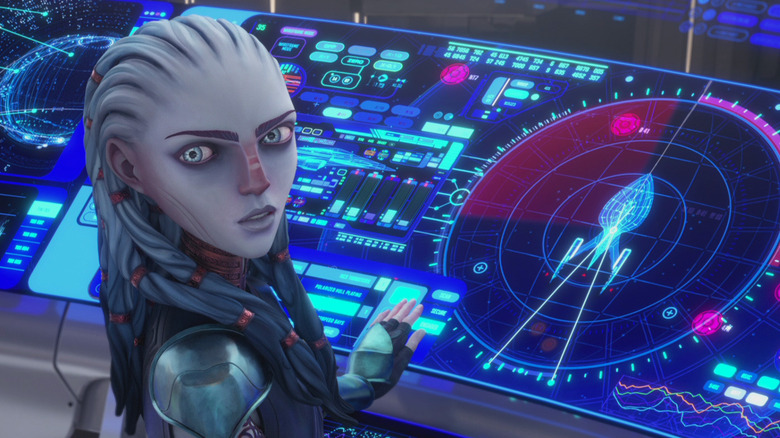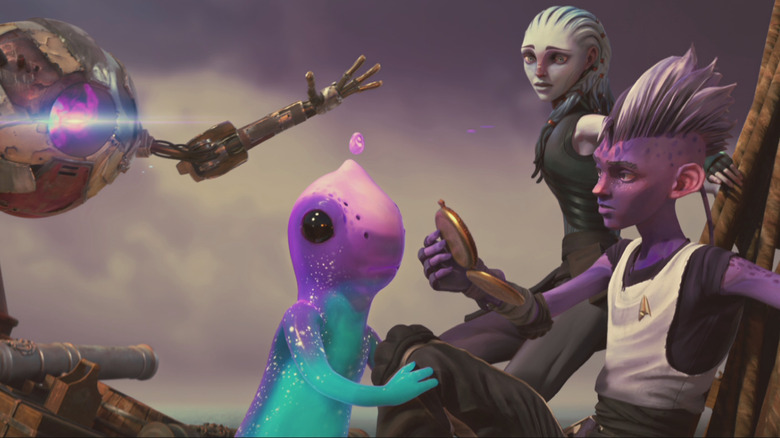Prodigy's Cancellation Signals A Shrinking Of The Star Trek Franchise
For a few years, it seemed that CBS All Access, aka Paramount+, was putting all its eggs in one of two baskets: "Star Trek" or "SpongeBob SquarePants."
It was 2017, and the streaming service debuted with the premiere of "Star Trek: Discovery," the first new "Star Trek" TV show since the cancelation of "Star Trek: Enterprise" in 2005. Over the next few years, multiple other Trek shows would be heartily scooped onto the service, providing a gluttony of programming.
Firstly, to keep viewers hooked on their streaming service, Paramount debuted "Short Treks." Shortly thereafter, it was announced that Patrick Stewart would be returning to the franchise with "Star Trek: Picard." Two animated shows started up: "Star Trek: Lower Decks" was a slightly more raunchy show for an older audience, while "Star Trek: Prodigy" debuted on Nickelodeon, aiming for a younger audience. Finally, "Star Trek: Strange New Worlds" spun off of "Discovery," and featured many legacy characters. A Trek spy series, "Section 31" was announced. No fewer than six shows seemed to be on the air simultaneously. That's a lotta trekkin'.
It was announced on June 23, 2023, however, that Paramount+ had canceled "Star Trek: Prodigy." Additionally — and very frustratingly — the series would be pulled from the service altogether. The cancelation of such a high-profile franchise product was likely done for tax write-off purposes. The show's second season will be completed, but another service will run it.
The ending of "Prodigy," however, is not the only recent end in the "Star Trek" world. Indeed, so much about Trek has been canceled, has ended, or has transformed, that audiences are likely witnessing an active contraction of the "Star Trek" universe. The salad days are over. It's time to get austere.
All good things ...
Back in March, it was also announced that "Star Trek: Discovery" would end after its fifth season, currently set to air in 2024. Additionally, as long ago as January of 2022, it was announced that "Star Trek: Picard" would end after three seasons. That third season just wrapped, and it's unlikely it will return. Although "Short Treks" may return, audiences have heard no news of that series since the final episode aired in January 2020. Also, the planned "Section 31" TV series was condensed into a single TV movie event, with no current release date.
That means by the end of 2024, the only Trek shows left standing will be "Strange New Worlds" and "Lower Decks." To be fair, those are the best of the lot. Make note, though, that "Strange New Worlds," because it's set only a few years before the events of the original 1966 series, will have to end its run after five seasons regardless. Its endpoint was written into the show's premise.
A new series, "Starfleet Academy," will also begin production in 2024. But even with that addition, we've gone from six or seven planned simultaneous Trek shows, all the way down to two or three. Alex Kurtzman, the current head honcho of all things "Star Trek," has announced no further plans for additional Trek shows or movies.
It was known for a long time — since the beginning — that the new "Star Trek" shows were really expensive. Variety reported in 2017 that "Discovery" was set to cost $8 to $8.5 million per episode, and that Netflix footed a portion of the bill. When "Discovery" didn't attract the mass audience it had quite hoped, it looked like the "all eggs in the Trek basket" strategy would need to be rethought.
Endgame
It's 2023, a "Trek" was canceled, and it looks like the rethinking has been done. We're looking at a future with a lot less.
One can look around at many of the major streaming services to see the trends in place. Disney+, Netflix, and especially HBO Max, now just called Max, have been canceling shows willy-nilly, hiding many of them from the public indefinitely, all for tax write-offs. For several years, most services overspent extravagantly, thinking that more and more people would constantly be signing up to see their premiere shows and movies. Some entire channels rose and fell in the 2017 to 2022 span; remember Quibi? After only a few years of a flooded marketplace, however, the streamers are starting to wither on the vine. The spending needed to stop. It seems the great reckoning has arrived. If there's a new streaming-only series or movie you love, buy it on physical media as soon as you can. There is now no guarantee that any service will keep it available.
And while it's easy to see the cancelation of "Prodigy" as indicative of larger marketplace trends, it still stings to think that Paramount would nix a facet of their most lucrative media franchise (outside of "SpongeBob"). "Prodigy" is a sign that no series, no matter how seemingly "safe," will be protected by assumed popularity or franchise association. The growth period is over. It's now time to shrink.
This, of course, means that anyone who might be hoping for Terry Matalas' proposed "Star Trek: Legacy" spinoff — pitched at the end of "Star Trek: Picard" — will be sorely disappointed. Given the current spending ethos, there's no way Paramount will invest in something of that magnitude. Farewell, Enterprise-G.
What we leave behind
"Legacy," you see, would require paying several known actors — Jeri Ryan and John De Lancie would be on the cast — high salaries. It would also require a lot of expensive starship SFX. By contrast, the proposed new "Academy" series will star a new cast of fresh — and less expensive — faces, and will be set on Earth. It will take place in the 32nd century, spinning off from "Discovery," a show that Paramount already invested a lot of money into. Given the competition, there is no way "Legacy" is going to happen. My apologies to Matalas and the world's "Picard" fans.
The actual quality of "Prodigy," of course, isn't really part of the equation. Just to briefly editorialize, though: "Prodigy" was a sweet show that employed a lot of "Star Trek" stories in an overall arc that bore a stronger resemblance to "Star Wars." The teenage protagonists were wounded sweethearts who, over the course of the show's 20 episodes, learned to behave like a crew and grow up a little bit. It was modest, and it included a hologram of Captain Janeway (Kate Mulgrew), allowing for some fun legacy moments. Later in the series, the actual Admiral Janeway would appear on the series as well.
There is a note of ambivalence at the end of all this. It's disappointing to think that "Star Trek" could be nixed at any moment, even if it's popular, and that we are still — as we have always been — victims of the caprices of major entertainment corporations. At the same time, though, perhaps seven "Star Trek" shows at the same time was too dang much. I would rather have two or three high-quality shows than seven expensive messes. Quality, after all, should outstrip quantity.



